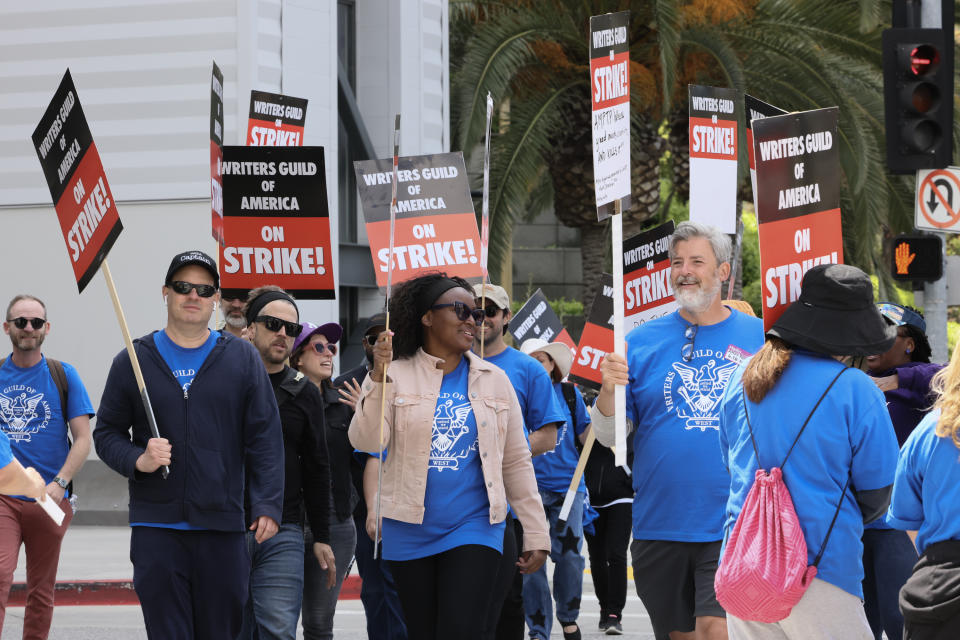Meet the Producers Who Want That (Second) ‘P’ Out of ‘AMPTP’

For writers and actors on strike, producers rank high among unlikely Hollywood allies. After all, the AMPTP is the Alliance of Motion Picture and Television Producers, with “producers” becoming a natural shorthand for the many studios, conglomerates, and publicly traded companies now playing hardball.
Indie producers, who would like you to know that is not the case, are now fighting to change what they believe is a narrative mastered by the AMPTP. If producers were to unionize, it would cost AMPTP members millions in healthcare, pension, and residuals. Producer Brent Emery (“The Stanford Prison Experiment”) believes the AMPTP undercuts the producers’ efforts by confusing the public — i.e., the Alliance of Motion Picture and Television Producers sounds like it includes, well, all producers. So how could there be the need for a producers’ union?
More from IndieWire
The Actors Guild Just Made a Big Change to Its Interim Agreements
These 12 Top Media Execs Are on a 'Regular' Phone Call to Solve the Strikes
“We’re from cradle to grave on these projects,” Emery told IndieWire. “These aren’t studio films, they’re independent films. We’re paying taxes every year, we’re making sure everyone’s getting paid the residuals, except for us. We’re making sure everyone gets their back-end participation, that statements are being sent on time. We live with these films for sometimes decades after everyone else is gone, and we started oftentimes before anyone else is there.”
Emery also is an at-large officer with the Producers Union, a group of independent, narrative-feature producers that launched in 2020 as a “supervisory union” with the goal of organizing and winning a seat at the bargaining table. A consent decree that dates back to 1974 declared producers as management and, as such, haven’t been allowed to unionize. Producers Union has a little over 300 members and is separate from the 8,000-member Producers Guild of America. The PGA is a non-profit trade organization that does not have collective bargaining power, despite a long history of lawsuits and lobbying in an effort to be recognized.
Emery, along with his colleagues on the Producers Union executive committee Sofia Sondervan (“Cadillac Records”) and Laura Lewis (“Mr. Malcolm’s List”), are not AMPTP members. And they think being lumped in with corporate juggernauts gives them a bad name.
On July 31, the Producers Union launched a Change.org petition asking that the AMPTP remove the second “P” from its name. They believe that real producers, the ones who work project to project with the same gig-economy concerns as their peers, are not part of the union conversations.

“We’re trying to get producers to be recognized with the same benefits that everybody else has pretty much above or below the line,” Emery said. “As producers have become employees of AMPTP members, we have been left holding the bag. We have to abide by the negotiations that we have no say in, and we don’t get afforded the same pension, health care, and residuals that every other union is getting and fighting for a fair shake right now.”
Lewis says that prior to the writers strike in 2007-08, independent producers had more access to backend on their movies or shows; sometimes overall deals paid for staff overhead. That dwindled once streaming took hold and today overall deals are ultra rare for any producer who doesn’t also write, direct, or act. Many indie producers now live off upfront fees.
“Producers mainly are all independent and selling to the studios and we don’t get development fees. So we’re working for free,” Lewis said. “It’s the same thing the writers, directors, actors, are fighting for now with decreased residuals from streaming. Producers don’t even get residuals. So without back-end and without residuals, there’s nothing in between besides what you’re getting paid up front. Then those fees are basically always squeezed because we have nothing protecting our minimums. So that’s why we are now wanting to fight.”
Because they’re hired guns on their own projects, they’re often the first whose fees are cut when a project faces budget concerns. Studios know that producers will be willing to sacrifice anything, including their fees, to get a project over the finish line.
“The common perception is that we almost should be grateful that we get to work on it when we’re really working for free, and that’s just assumed that we do that,” Sondervan said.
With a dozen or more producers on a single project, their roles are unprotected and healthcare is not guaranteed. Emery said that when a project he worked on suddenly shifted from theatrical to streaming without his knowledge, he had to fight for back-end that he was now told was worthless.
“Not only do we have all these things that are going to be erasing our way of life, we have no protections. But if we ask for them, it’s often, ‘Pound sand, or we’ll shut the movie down,'” Emery said.
Just as mini-rooms have become a bane for writers, TV producers now face an unpaid streaming development pipeline that stretches into years rather than months. Those who find success realize fees for six to 10 episodes rather than the once-traditional 22.

Lewis, who has experience as a non-writing TV producer, knows that pain firsthand.
“I found the book, I attached the actor, set it up, got a straight-to-series order, writers were all paid, obviously the option on the book was paid, and then the actor dropped out right before we started prep,” Lewis said. “The only person on that show that did not get paid was me, the producer. And that was after a couple of years of work. We have nothing to fight back when we’re making our deals. They always say ‘precedent, precedent, precedent’ is why we don’t have anything to fall back on to fight for us. And that’s what we’re trying to protect against. We’re tired of working for free.”
Part of the challenge for the Producers Union is, like everyone else, there’s no work to be had. While Emery, Sondervan, and Lewis are each waiting on interim agreements with SAG-AFTRA, the writers aren’t talking to them at all. The WGA strike rules FAQ explicitly treat producers as “representatives of struck companies” and the guild has not granted its own interim agreements, so no development is getting off the ground.
“We’re trying to use this time to raise awareness,” Lewis said. “We have been shocked at how many people don’t know that the PGA is not union. So we’ve just been trying to really clarify what a producer is, how we’re represented. I’ve talked to numerous writers and actors who don’t know we don’t have healthcare or residuals. They’re shocked. When everyone’s paying attention to labor issues, [we want] to make sure they know ours as well. Hopefully we can make some change for us, too.”
The Producers Union has yet to receive formal recognition by any AMPTP company.
“One of the things that producers are feeling a little bit lonely about is the fact that we still believe in what the writers and the actors are fighting for,” Lewis said. “We’re just also nervous it will never trickle down. We’re hoping that this galvanizing moment of everyone striking will help them see our plight too and support us when or if the time comes that we need their backs, too.”
Best of IndieWire
Unsimulated Sex Scenes in Film: 'Nymphomaniac,' 'Brown Bunny,' 'Little Ashes,' and More
The Best LGBTQ Movies and TV Shows Streaming on Netflix Right Now
Sign up for Indiewire's Newsletter. For the latest news, follow us on Facebook, Twitter, and Instagram.

 Yahoo News
Yahoo News 
